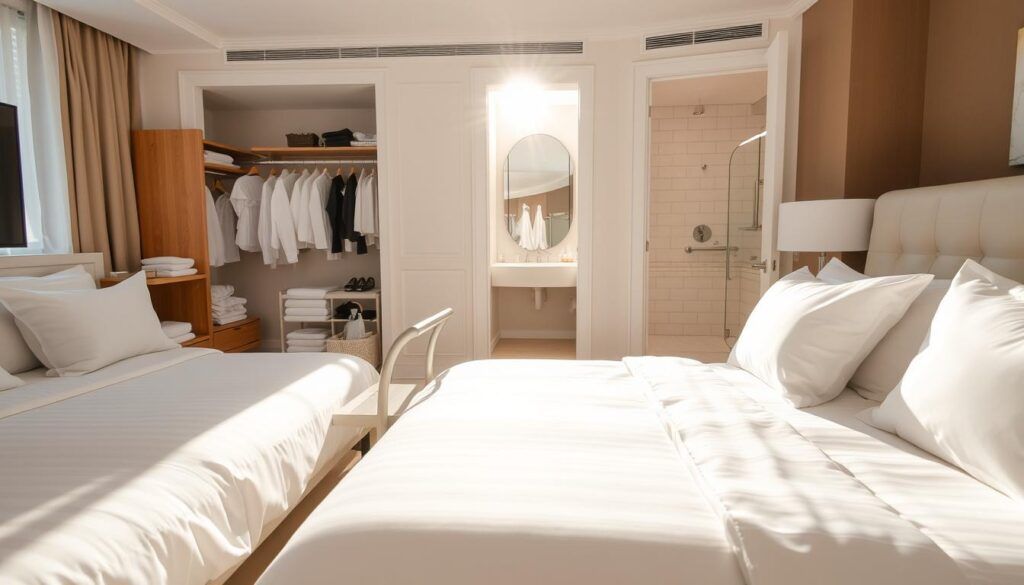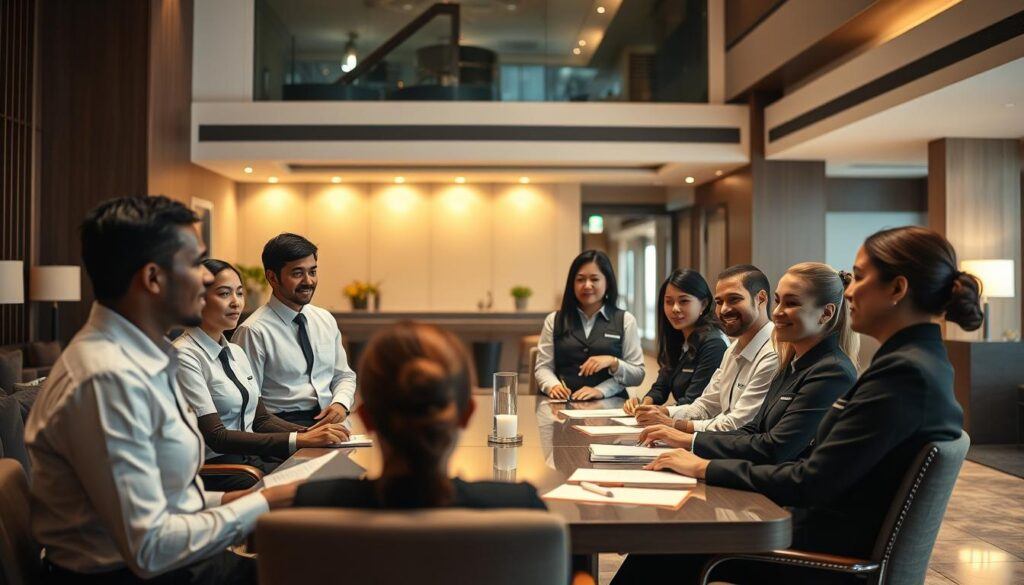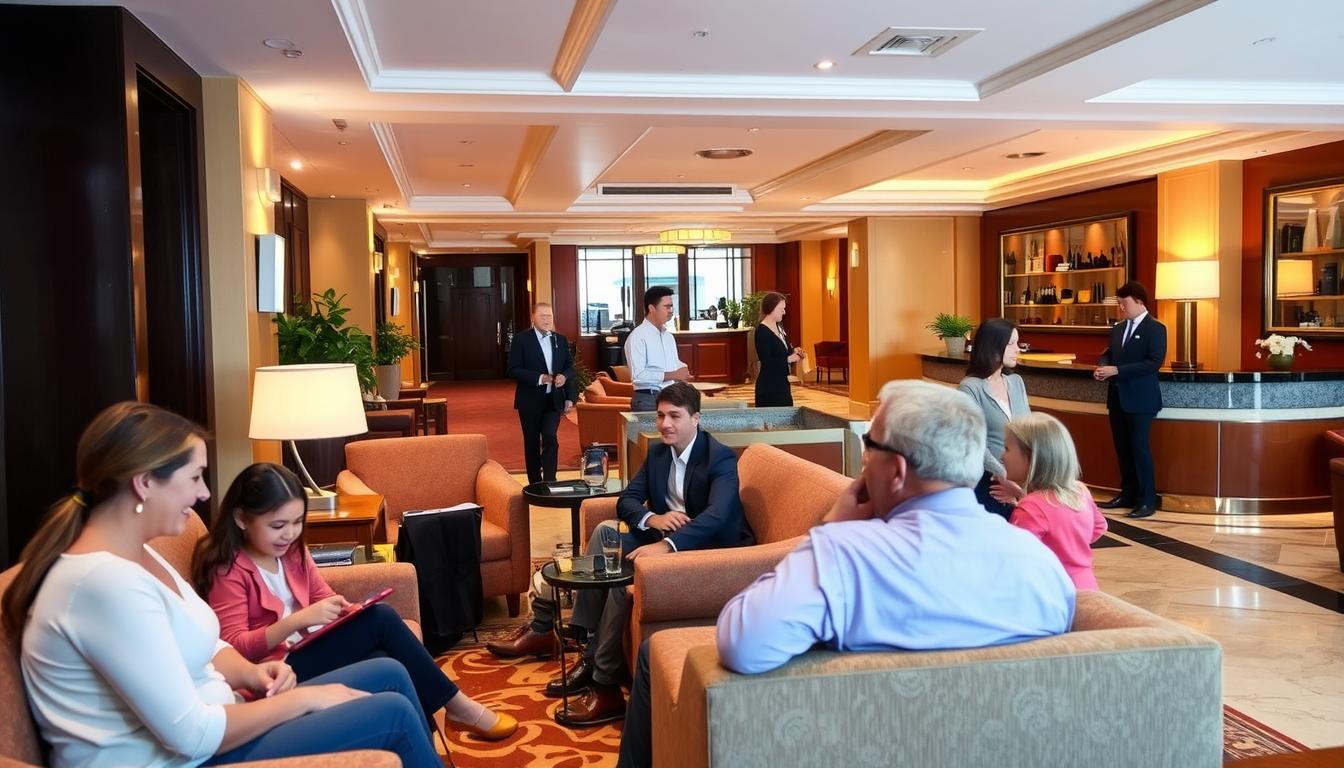In the hospitality world, guest satisfaction is key to your hotel’s success. It’s hard to keep guests happy without a clear plan. That’s where Standard Operating Procedures (SOPs) help.
SOPs, when well-made and used, help your team meet guest needs. They keep service high and make every stay special. With good SOPs, you can really boost hotel guest satisfaction.
Key Takeaways
- Understand the importance of SOPs in the hospitality industry.
- Learn how SOPs can improve guest satisfaction rates.
- Discover the benefits of implementing effective SOPs.
- Find out how to create a complete hotel operating manual.
- Improve your hotel’s overall guest experience with SOPs.
The Critical Link Between SOPs and Guest Satisfaction
SOPs are key to keeping hotel services consistent and high-quality. They help ensure guests have a smooth experience from start to finish.
What Are Hotel SOPs and Why They Matter
Standard Operating Procedures (SOPs) are detailed guides for specific tasks. In hotels, they are vital for maintaining top-notch service standards.
Definition and Purpose of Standard Operating Procedures
SOPs help ensure tasks are done right and consistently. This reduces mistakes and boosts efficiency. They give staff a clear idea of what to do in each situation.
The Structure of Effective Hotel SOPs
Good SOPs are clear, easy to follow, and updated often. They should have clear goals, step-by-step guides, and visuals.
The Direct Impact of SOPs on Guest Experience
SOPs greatly affect the service guests receive. By sticking to these procedures, staff can offer a consistent and quality experience.
Statistics on SOP Implementation and Guest Satisfaction
| Industry | SOP Implementation Rate | Guest Satisfaction Rate |
|---|---|---|
| Hospitality | 80% | 85% |
| Luxury Hotels | 90% | 92% |
| Budget Hotels | 70% | 78% |
Research shows hotels with good SOPs have happier guests. By working on SOPs, hotels can greatly enhance their service and guest happiness.
Identifying Key Areas for SOP Development in Your Hotel
To make guests happier, it’s important to find key areas for SOPs. Standard Operating Procedures (SOPs) help keep things consistent and high-quality in hotels. By focusing on these areas, you can greatly improve how guests feel.
Front Desk and Check-in/Check-out Procedures
The front desk is where guests first meet. Streamlining check-in and check-out makes a great first impression. This means greeting guests, handling their registration, and giving them all the info they need.
Housekeeping and Room Maintenance Standards
Keeping rooms clean and tidy is key to guest happiness. SOPs should cover how to clean rooms, change linens, and restock supplies. Consistency is essential for a great stay.
Food and Beverage Service Protocols
If your hotel has a restaurant, SOPs are vital for great food and service. They cover taking orders, serving guests, and handling payments. Training staff well ensures a smooth dining experience.
Guest Request Handling and Problem Resolution
Quickly handling guest requests and solving problems is important. SOPs should guide how to manage requests and solve complaints professionally.
Common Guest Complaints and Prevention Strategies
Knowing what guests often complain about helps prevent these issues. Problems like cleanliness, noise, and delays can be avoided with the right SOPs.
Service Recovery Procedures
Even with the best planning, things can go wrong. Service recovery procedures help fix problems and turn a bad experience into a good one.
| Area | SOP Focus | Benefit |
|---|---|---|
| Front Desk | Streamlined check-in/check-out | Improved guest satisfaction |
| Housekeeping | Consistent room maintenance | Enhanced cleanliness and comfort |
| Food & Beverage | Efficient service protocols | Better dining experience |
Creating Effective SOPs for Front Desk Operations
The front desk is the first thing guests see, making it key to have good SOPs. A well-run front desk sets the mood for a guest’s stay. It affects their happiness and if they’ll come back.
Check-in Process Optimization
Improving the check-in process is vital for a good start. This means:
- Having all needed documents ready and easy to find
- Teaching staff to welcome guests warmly and quickly
- Making the check-in process fast to cut down wait times
First Impression Guidelines
Staff should aim to make a great first impression. They should be attentive, knowledgable, and polite. This includes:
- Welcoming guests by name when it’s possible
- Sharing clear info about hotel services and rules
- Helping with luggage and other needs
Efficiency Without Sacrificing Personalization
Being efficient is important, but keeping it personal is key too. This can be done by:
- Teaching staff to notice and meet guest preferences
- Using tech to make things smoother without losing the personal touch
- Encouraging staff to talk to guests and solve their problems
Guest Information Management
Managing guest info well is essential for personal service. This means:
- Correctly recording what guests like and need
- Making sure all staff can see this info
- Using it to make the guest’s stay better and more satisfying
Handling Special Requests and VIPs
Dealing with special requests and VIPs needs top service and detail. SOPs should cover:
- How to spot and treat VIP guests
- Steps for handling special requests, like room upgrades
- Training all staff to know and act on these requests
Streamlining Check-out and Billing
The check-out process should be as smooth as check-in. This can be done by:
- Checking that all billing is right and up-to-date
- Teaching staff to handle check-out well and answer guest questions
- Offering fast check-out options to reduce wait times
Developing Housekeeping SOPs That Exceed Guest Expectations
Hotels need to create strong housekeeping SOPs to meet guest needs. These SOPs ensure a clean, welcoming stay. They are key to a hotel’s success.
Room Cleaning Standards and Checklists
Setting high room cleaning standards is vital. This means:
- Detailed checklists for thorough cleaning
- Regular training for housekeeping staff
Daily Cleaning Procedures
Daily cleaning must be well-planned. Every room should be spotless. This includes making beds, cleaning bathrooms, and dusting and vacuuming.
Deep Cleaning Schedules
Deep cleaning is also important. Deep cleaning schedules cover tasks like carpet and upholstery cleaning, and detailed bathroom sanitizing.
Turndown Service Protocols
Turndown service adds a luxury touch. SOPs should guide how to prepare the room, leave a treat, and make the bed inviting.
Public Area Maintenance Procedures
Public areas must match room standards. This includes regular cleaning and inspections of lobbies, corridors, and fitness centers.

Quality Control and Inspection Methods
To check if SOPs work, quality control measures are needed. This includes regular checks and feedback to keep improving.
By following these housekeeping SOPs, hotels can boost guest happiness and loyalty. This leads to more business success.
How to Use SOPs to Improve Hotel Guest Satisfaction Through F&B Excellence
Exceptional F&B experiences can boost guest satisfaction. Well-defined SOPs help standardize service. This ensures quality and consistency, improving guest experiences.
Restaurant Service Standards
Clear restaurant service standards are key for a great dining experience. This includes:
Table Service Protocols
Training staff on table service is essential. Guests should get prompt, accurate service. Food should be served quickly.
Timing and Coordination
Timing food service is critical. It ensures dishes are hot and served on time. This means syncing kitchen and front-of-house service.
Room Service Delivery Protocols
Room service needs clear delivery protocols. Orders must be accurate, delivered fast, and presented well.
| Protocol | Description | Benefit |
|---|---|---|
| Order Accuracy | Double-check orders before delivery | Reduces errors, enhances guest satisfaction |
| Prompt Delivery | Deliver within the promised timeframe | Improves guest experience and loyalty |
| Professional Presentation | Present orders attractively and professionally | Enhances the overall dining experience |
Bar and Lounge Operation Guidelines
Bars and lounges are key to F&B experiences. SOPs should cover drink prep, service, and ambiance.
“The ambiance and service at a hotel’s bar or lounge can significantly influence a guest’s overall satisfaction and likelihood of returning.”
Handling Dietary Restrictions and Special Requests
Hotels must handle dietary needs and special requests. Training staff on various dietary needs is important.
Implementing these SOPs can greatly improve F&B services. This leads to better guest satisfaction. For more on SOPs, check out a detailed hotel operations manual.
Implementing SOPs for Effective Guest Communication
Hotels need to focus on clear and consistent communication to improve guest satisfaction. Good communication makes a stay memorable, encourages guests to come back, and leads to positive reviews.
Pre-arrival Communication Templates
Creating SOPs for pre-arrival messages sets the stage for a great stay. This includes templates for confirmation emails, surveys, and welcome messages. For example, a pre-arrival survey can help tailor services to guest preferences.
In-stay Guest Interaction Guidelines
During a guest’s stay, it’s important to interact well. SOPs should cover verbal communication standards and digital communication protocols for consistency.
Verbal Communication Standards
Staff should greet guests warmly and use their names. They should also be attentive to guests’ needs. A simple SOP is for staff to introduce themselves and ask how they can help.
Digital Communication Protocols
Hotels need clear digital communication rules, like response times on social media and apps. For example, responding to inquiries within 30 minutes is a good SOP.
Post-stay Follow-up Procedures
Follow-up after a guest’s stay can make a big impression. SOPs can include sending thank-you emails or messages on social media. It shows guests their feedback matters.
Managing Online Reviews and Feedback
Handling online reviews is key to guest communication. Hotels should have SOPs for both positive and negative reviews. A quote from a satisfied guest can be a great marketing tool.
“The way to get started is to quit talking and begin doing.” – Walt Disney
By following these SOPs, hotels can greatly improve the guest experience. This leads to higher satisfaction and positive word-of-mouth.
| Communication Stage | SOP Component | Example |
|---|---|---|
| Pre-arrival | Confirmation Email | Personalized welcome message |
| In-stay | Verbal Communication | Staff greeting guests by name |
| Post-stay | Follow-up Email | Thank-you message with survey link |
Essential Tools and Resources for Hotel SOP Development
Well-crafted SOPs are vital for hotel success. They help improve guest satisfaction and make operations smoother. The right tools and resources are key to creating effective SOPs.
SOP Templates and Formats
Using standardized SOP templates makes development easier. These templates have a set format, ensuring all important details are included. Consistency is important, and templates help achieve this.
Digital SOP Management Systems
Digital systems provide a central place for SOPs. They make it easier to store, update, and access SOPs. This boosts efficiency and keeps staff up-to-date with procedures.
Our Complete Hotel Operating Manual
Our hotel operating manual is a great resource for SOPs. It offers detailed procedures and guidelines for the hospitality industry.
What’s Included in Our Downloadable Resource
The manual covers many topics, from front desk to housekeeping. It’s a detailed guide for hotel staff.
How to Customize It for Your Property
To customize the manual, adapt procedures to your hotel’s needs. This makes SOPs relevant and effective for your operation.
Industry Standards and Benchmarks
Knowing industry standards and benchmarks is essential. It helps hotels compare their practices with the best in the industry.
Training Your Staff to Follow SOPs Consistently
To make SOPs work, training staff well is key. This ensures guests have a smooth experience. Hotels need a thorough training plan that covers all SOPs.
Effective SOP Training Methods
Hotels should use many training methods. This includes classroom training, on-the-job training, and digital training modules. Mixing these methods helps staff learn in different ways.
Role-playing and Practical Exercises
Role-playing and practical exercises are vital. They help staff practice real-life situations. This way, they learn to apply SOPs correctly.
Scenario-Based Training Techniques
Scenario-based training presents staff with job-like situations. It teaches them how to act right and consistently.
Handling Difficult Guest Situations
Training should also cover dealing with tough guests. Role-playing helps staff learn to solve problems well. This keeps guests happy.
Monitoring and Reinforcement Strategies
After training, checking if staff follows SOPs is key. Use regular audits, feedback, and rewards for following SOPs.
Creating a Culture of SOP Adherence
To keep SOPs followed, hotels need a culture that values them. This means leaders must show they care, communicate SOPs’ value, and offer ongoing training.
| Training Method | Description | Benefits |
|---|---|---|
| Classroom Training | Formal instruction in a classroom setting | Ideal for introducing new SOPs, allows for Q&A |
| On-the-Job Training | Practical application of SOPs during work | Provides hands-on experience, immediate feedback |
| Digital Training Modules | Online training resources accessible at any time | Flexible, self-paced, can be updated easily |

By using these strategies, hotels can make sure staff follows SOPs well. This leads to happier guests and a better brand image.
Measuring the Impact of Your SOPs on Guest Satisfaction
To see how well your Standard Operating Procedures (SOPs) work, you must check their effect on guest happiness. This lets you spot what needs bettering and make choices based on facts to improve the guest experience.
Key Performance Indicators to Track
To measure the impact of SOPs, track important Key Performance Indicators (KPIs). Some key KPIs include:
- Guest satisfaction scores
- Response times to guest requests
- Room cleanliness ratings
- Check-in and check-out efficiency
Guest Satisfaction Survey Design
Creating good guest satisfaction surveys is key to understanding your SOPs’ impact. Think about these points:
Effective Question Formulation
Make questions clear, short, and about your hotel’s services. Mix multiple-choice and open-ended questions to get full feedback.
Timing and Distribution Methods
Send surveys at the best time, like right after check-out or a few days later by email. Use different ways to send surveys, like email, SMS, and in-room, to get more answers.
Analyzing Review Data and Feedback
Looking at guest reviews and feedback is important to see what’s good and what’s not about your SOPs. Use this info to spot trends and patterns that can help you get better.
Making Data-Driven SOP Improvements
Use the insights from KPIs, surveys, and reviews to make specific improvements to your SOPs. This will help you make guests happier and keep improving your hotel’s services.
Conclusion: Transforming Guest Experiences Through Systematic SOPs
Implementing Standard Operating Procedures (SOPs) can greatly improve hotel guest satisfaction. SOPs are key in making hotel operations smooth, from checking in at the front desk to housekeeping and food services. By following hotel SOP best practices, you ensure every guest has a consistent and high-quality experience.
To boost guest satisfaction, create SOPs for important areas like guest communication and problem solving. Also, focus on service standards. Regularly update your SOPs based on guest feedback and performance data. This helps you spot areas for improvement and make smart decisions to better the guest experience.
By using the tips from this article, you can make your hotel operations more efficient and guest-focused. Start improving your guest experiences today with systematic SOPs that prioritize your guests’ needs.

